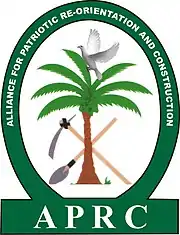Alliance for Patriotic Reorientation and Construction
The Alliance for Patriotic Reorientation and Construction is a political party in the Gambia. Founded by army officers who staged a coup in 1994, it was the dominant ruling party from 1996 until 2016 with president Yahya Jammeh.
Alliance for Patriotic Reorientation and Construction | |
|---|---|
 | |
| Leader | Fabakary Jatta |
| Founder | Yahya Jammeh |
| Founded | 1996 |
| Headquarters | Banjul |
| Ideology | Anti-colonialism Religious conservatism |
| Political position | Right-wing |
| National Assembly | 5 / 58
|
| Pan African Parliament | 4 / 5
|
History
It was formed in 1996 to support army leader Yahya Jammeh's campaign for the 1996 elections. It generally garners high support among voters from Jammeh's Jola ethnic group. Most appointed APRC government officials were from this group as well.
Jammeh won the 2001 presidential elections with 52.8% of the popular vote.[1] In National Assembly elections in 2002, the party won 45 of 48 seats, 33 of them unopposed.[2] The elections were boycotted by the oppositional United Democratic Party.
APRC candidate and incumbent Yahya Jammeh won a third five-year term in presidential elections held on 22 September 2006, receiving 67.3% of the vote.
The APRC won 42 of 48 seats in the 25 January 2007 National Assembly election[3] and 43 of 48 seats in the 29 March 2012 National Assembly election.
In the 2016 presidential elections, for the first time since officially taking power in the 1996 presidential elections, APRC incumbent Jammeh lost the presidency to coalition challenger Adama Barrow, garnering only 39.6% of the vote to Barrow's 43.3%.[4] In the 2017 parliamentary elections, the APRC lost much of its support, while its long-time rival United Democratic Party gained a landslide victory.
Electoral history
Presidential elections
| Election | Party candidate | Votes | % | Results |
|---|---|---|---|---|
| 1996 | Yahya Jammeh | 220,011 | 55.8% | Elected |
| 2001 | 242,302 | 52.8% | Elected | |
| 2006 | 264,404 | 67.3% | Elected | |
| 2011 | 470,550 | 71.5% | Elected | |
| 2016 | 208,487 | 39.6% | Lost |
National Assembly elections
| Election | Party leader | Votes | % | Seats | +/– | Position | Government |
|---|---|---|---|---|---|---|---|
| 1997 | Yahya Jammeh | 160,470 | 52.13% | 33 / 49 |
Supermajority government | ||
| 2002 | 29,097 | 51.05% | 45 / 53 |
Supermajority government | |||
| 2007 | 157,392 | 59.70% | 42 / 53 |
Supermajority government | |||
| 2012 | 80,289 | 51.82% | 43 / 53 |
Supermajority government | |||
| 2017 | Fabakary Jatta | 60,331 | 15.91% | 5 / 53 |
Opposition |
References
- "Gambia opposition unite to fight". BBC. 18 January 2005.
- Barry Turner (7 February 2017). The Statesman's Yearbook 2005: The Politics, Cultures and Economies of the World. Springer. ISBN 9780230271333.
- Elections in The Gambia African Elections Database
- "The Total Of Final Election Results". Independent Electoral Commission of The Gambia. 5 December 2016. Archived from the original on 7 December 2016. Retrieved 23 January 2017.